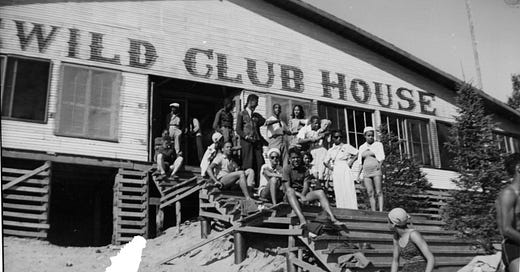If you enjoy these Black History stories and want to keep discovering more, consider becoming a subscriber today. Your support helps me share these important narratives with even more people.
In 1912, amidst the harsh climate of Jim Crow America, a group of visionary entrepreneurs saw something more than trees and untouched land in the dense forests of Michigan. They saw opportunity to launch an idea that would give birth to Idlewild, a haven built by and for Black Americans during an era when segregation was the brutal norm.
They built paradise because paradise wouldn’t welcome them.
Founders initially marketed Idlewild through Black publications, like the Chicago Defender, intelligently targeting the flourishing Black middle class in search of respite where they could breathe free from the white gaze. With affordable land and a bold promise an escape from oppression, prejudice, and fear. Idlewild rapidly blossomed into a vibrant vacation destination. Doctors, teachers, and civil rights pioneers bought up properties; legendary names like W.E.B. Du Bois and Dr. Daniel Hale Williams not just recognizing Idlewild as property but as potential.
Where Black Culture Shined Brightest
Idlewild quickly became more than just a cozy getaway. It erupted into one of the hottest cultural hubs in the country, exploding with talent reminiscent of Harlem’s golden nightlife. Clubs pulsed with the sounds of legendary entertainers like Aretha Franklin, B.B. King, Cab Calloway, The Four Tops, Etta James, and Della Reese. Here, in the heart of Michigan, musicians crafted melodies, writers penned powerful prose, and Black culture celebrated itself unapologetically, authentically, and triumphantly.
Idlewild wasn't merely a vacation spot, it was a proud stop on the famed “Chitlin' Circuit,” offering a welcoming stage for artists excluded elsewhere. It was freedom set to music, defiance painted in bright neon lights.
Integration: A Double-Edged Sword
But the irony of Idlewild’s story lies in its decline. The very racism and segregation that created this sanctuary also guaranteed its demise. The Civil Rights Movement, while essential, chipped away Idlewild’s necessity. As Black families finally had doors opening to previously forbidden resorts and establishments elsewhere, Idlewild lost its spark, struggling to reinvent itself in changing times. Once alive with music and laughter, it gradually became a quieter town, a place for relaxation and retirement rather than bustling nightclubs and vibrant festivals.
Yet, Still It Rises
Idlewild’s flame might have dimmed—but it never died. Today, it stands resilient, refusing to be erased. With tireless efforts, the community has established the Idlewild Historic and Cultural Center, preserving and showcasing this remarkable history. Each visitor that walks through these quiet Michigan roads carries forward the legacy of a community who built their own paradise in defiance of an America that refused to share its own.
Idlewild stands as more than history, it’s a lesson in resilience.
It whispers insistently of dignity and community carved out of adversity. It’s a chapter America doesn’t often highlight—but certainly one we should never forget.
What are you opinions of Mississippi Burning? We'd love to hear your thoughts and ideas in the comments!
Subscribe to my YouTube channel and podcast for bi-weekly episodes and get exclusive content when you become a paid subscriber.
Thank you for joining us today. For more engaging stories, visit One Mic History. Your continued support is greatly appreciated, we love you all.
-Countryboi







